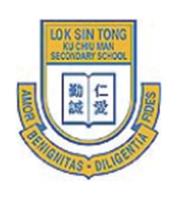| Language Policy |
The medium of instruction in the junior streams is Chinese for all subjects except English Language. The policy will promote classroom interaction and high-order thinking. Measures to help students become biliterate and trilingual include the recruitment of expatriate teachers, organization of activities for a language-rich environment, implementation of the Extensive Reading Scheme as well as the provision of supplementary and bridging courses.<br>The Cross-curricular English Planning Team coordinates diversified ‘Extended Learning Activities in English’ to enhance students’ English abilities in various aspects, including the implementation of cross-curricular English Enhancement Courses, Morning Reading with English newspaper, design of English reading materials, organization of English Learning Day and lunchtime English activities, provision of bridging courses in summer holiday to facilitate students’ English learning in senior streams. |
| Learning and Teaching Strategies |
The school aims to help students acquire knowledge and develop positive values through the implementation and adaptation of the Formal and Hidden Curriculum, in a bid to align teaching with students’ diverse abilities.<br><br>The school was granted funding to develop Curriculum Integration of Integrated Humanities and Life Education, other initiatives include “Training on Skill Acquisition for Junior Secondary Students”, “Time is of the Essence: Innovative Schooling – Restructure of Learning & Teaching Pattern” and “Blooming School”. The school was also funded to promote “Student-centred Study Tour”, “Metacognitive Teaching Strategies” and “Biotechnology Education” through History and Culture, Chemistry and Biology respectively, "My Pledge to Act - Be grateful and treasure what we have, stay positive and optimistic". Together with e-learning, the interaction between learning and teaching and the interest of pre-lesson preparation have been strengthened so as to reinforce self-directed learning and cater for learners’ diversity.<br><br>The school was funded “IT Innovation Lab” under the Office of the Government Chief Information Officer (OGCIO). Through cross-curriculum collaboration among various subjects in Technology Education, Personal, Social and Humanities Education, activities have been organized to enrich learning in line with the formal curriculum. Opportunities are also given to students with various interests and abilities to participate in competitions and activities relating to “Science, Technology, Engineering and Mathematics Education”. Students learn and gain experience from valuable learning activities. STEM Education received School-based Support Services from the EDB and joined CUHK Jockey Club AI for the Future Project to enhance student learning by interweaving teacher professional development, school-based curriculum development and school development. |
| School-based curriculum |
1. Electives: 2X and 3X. Our students are provided with school-based curriculum in Computer Literacy.<br> 2. Curriculum highlights: Our students are provided with school-based curriculum in Computer Literacy. It adopts strategies of Diversity Learning as well as utilize e-learning platforms and online learning resource banks to facilitate the development of self-directed learning.<br>The department of Information & Communication Technology was funded by the Enriched IT Programme of the Office of the Government Chief Information Officer. With the development of Information and Technology, students’ abilities in programming as well as creative thinking are enhanced. Students are encouraged to participate in various competitions; they were given a number of awards. |
| Approach to Catering for Learner Diversity |
Classes are structured according to students' interests and abilities. Major subjects including Chinese, English and Mathematics are allotted extra resources to help implement small-class teaching. To cater for students’ diversity and create a learning atmosphere, computing devices are installed to promote self-directed learning and various modes of teaching, such as flipped classroom, small-group learning and inquiry-based learning. |
| Approach to Integrated Education |
Inclusive Education is carried out by a whole school approach. The Student Support Committee comprises SEN coordinator, a teaching assistant and social workers. The school also works closely with EDB and educational psychologist to conduct periodic assessments. Parents are invited to meetings to work out an individual education plan for their children, evaluate the effectiveness of such plans, and learn skills that can help and guide their children holistically.<br><br>The school uses the Learning Support Grant to pay for services such as speech therapy, social skills training, after-school support, and hiring qualified personnel specializing in support for students with SEN. |
| Education Support for Non-Chinese Speaking (NCS) Students |
|
| Home-School Co-operation |
The Parent-Teacher Association plays a crucial role in facilitating home-school cooperation. Activities for parents such as consultation meetings, picnics, computer courses and horticulture classes are arranged regularly to strengthen the ties between parents and school while fostering harmony in the campus. Their concerted efforts go a long way to help with students’ whole-person development. |
| School Ethos |
The school has an ethos of sincerity and simplicity. The school attaches much importance to moral and civic education and student guidance by providing academic mentoring and life education. With class as the basis, class teachers play an advisor's role in nurturing whole-person development, thus helping to strengthen the rapport between teachers and students. |
| School Development Plan |
1. Enhancing learning and thinking skills and strengthening STEM education.<br>2. Promoting positive school culture.<br>3. Increasing teaching capacity by building teamwork and pursuing continuous quality improvement. |
| Teacher Professional Training and Development |
Four to five teacher-development seminars or workshops are launched annually to address the school’s major concern. Teachers are encouraged or granted subsidies to attend courses, seminars or workshops conducted by EDB or other institutes. Local or overseas exchange programmes are also organised on regular basis. |
| Life-wide Learning |
The school runs more than 40 co-curricular activity groups to help students enhance their interpersonal skills and leadership potentials. The learning experiences will help them excel in further studies and future careers. Our students perform excellent in various co-curricular activities such as Handball Team, Volleyball Team, Basketball Team. |
